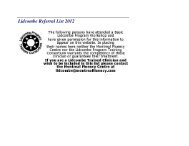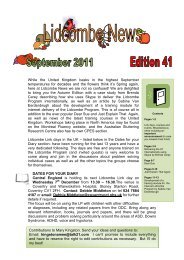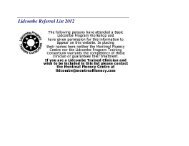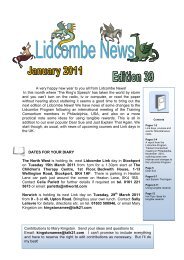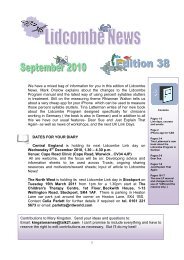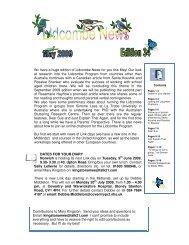Lidcombe News Edition 31st - Montreal Fluency
Lidcombe News Edition 31st - Montreal Fluency
Lidcombe News Edition 31st - Montreal Fluency
Create successful ePaper yourself
Turn your PDF publications into a flip-book with our unique Google optimized e-Paper software.
for clinicians. Unfortunately, to date many German colleagues feel<br />
overwhelmed by English written textbooks and articles, and consequently<br />
reject reading these. Therefore, most of the Speech-Language Pathologists<br />
attending the workshops in Germany do not acquire the <strong>Lidcombe</strong> Program<br />
textbook by Onslow, Harrison and Packman (2003), thereby lacking a great<br />
resource for treatment. We hope a German textbook covering the <strong>Lidcombe</strong><br />
Program for clinicians will close this gap. We maintain information about the<br />
<strong>Lidcombe</strong> Program, a schedule of upcoming workshops and a referral list for<br />
clinicians trained in LPTC workshops on our website at www.lattermann.net.<br />
One of the great advantages of the <strong>Lidcombe</strong> Program is the broad evidence<br />
base supporting its efficacy and efficiency. In Germany there is a lack of<br />
studies analysing the efficacy of early stuttering intervention. During the last<br />
five decades, to the best of my knowledge, only two studies were published in<br />
this area (Pape-Neumann, Bosshardt, Natke, & Oertle 2004; Randoll, 1988).<br />
The offer to set up a randomised controlled trial to investigate the impact of<br />
the <strong>Lidcombe</strong> Program on early stuttering in German-speaking preschoolers<br />
therefore was a great opportunity to collect data and start building an<br />
evidence-based support system to establish the method in Germany. In the<br />
next edition of the <strong>Lidcombe</strong> <strong>News</strong> I shall provide a short overview of the<br />
study outcome with German preschoolers, which has been published in the<br />
Journal of <strong>Fluency</strong> Disorders (Lattermann, Euler, & Neumann, 2008).<br />
Looking back on the last seven years, starting with our first email exchange in<br />
2001 and a vague idea about introducing the <strong>Lidcombe</strong> Program to German<br />
colleagues Anna, Bettina and I have come a long way. We have certainly<br />
learned a lot during this journey and are still learning. The <strong>Lidcombe</strong> Program<br />
Trainers Consortium is a great resource and stimulates ongoing discussions<br />
about further development of the <strong>Lidcombe</strong> Program based on all of our<br />
experiences and the feedback provided by trained colleagues. In the context<br />
of our plans, Follow-Up Days in Germany will certainly become a focus of<br />
attention for the years to come. We seem to have managed to lay foundations<br />
and get the <strong>Lidcombe</strong> Program going in Germany, nevertheless, there is still<br />
more work to do: We are looking forward to it!<br />
References<br />
Harris, V., Onlsow, M., Packman, A., Harrison, E., & Menzies, R. (2002). An<br />
experimental investigation of the impact of the <strong>Lidcombe</strong> Program on<br />
early stuttering. Journal of <strong>Fluency</strong> Disorders, 27, 203 - 214.<br />
Lattermann, C., Euler, H.A., & Neumann, K. (2008). A randomized control trial<br />
to investigate the impact of the <strong>Lidcombe</strong> Program on early stuttering in<br />
German-speaking preschoolers. Journal of <strong>Fluency</strong> Disorders, 33, 52 –<br />
65<br />
Onslow, M., Packman, A., & Harrison, E. (2003). The <strong>Lidcombe</strong> Program of<br />
Early Stuttering Intervention. Austin, TX: Pro-Ed.<br />
Pape-Neumann, J., Bosshardt, H. G., Natke, U., & Oertle, H. (2004). Testphase<br />
of the German program for the evaluation of stuttering therapies<br />
13



